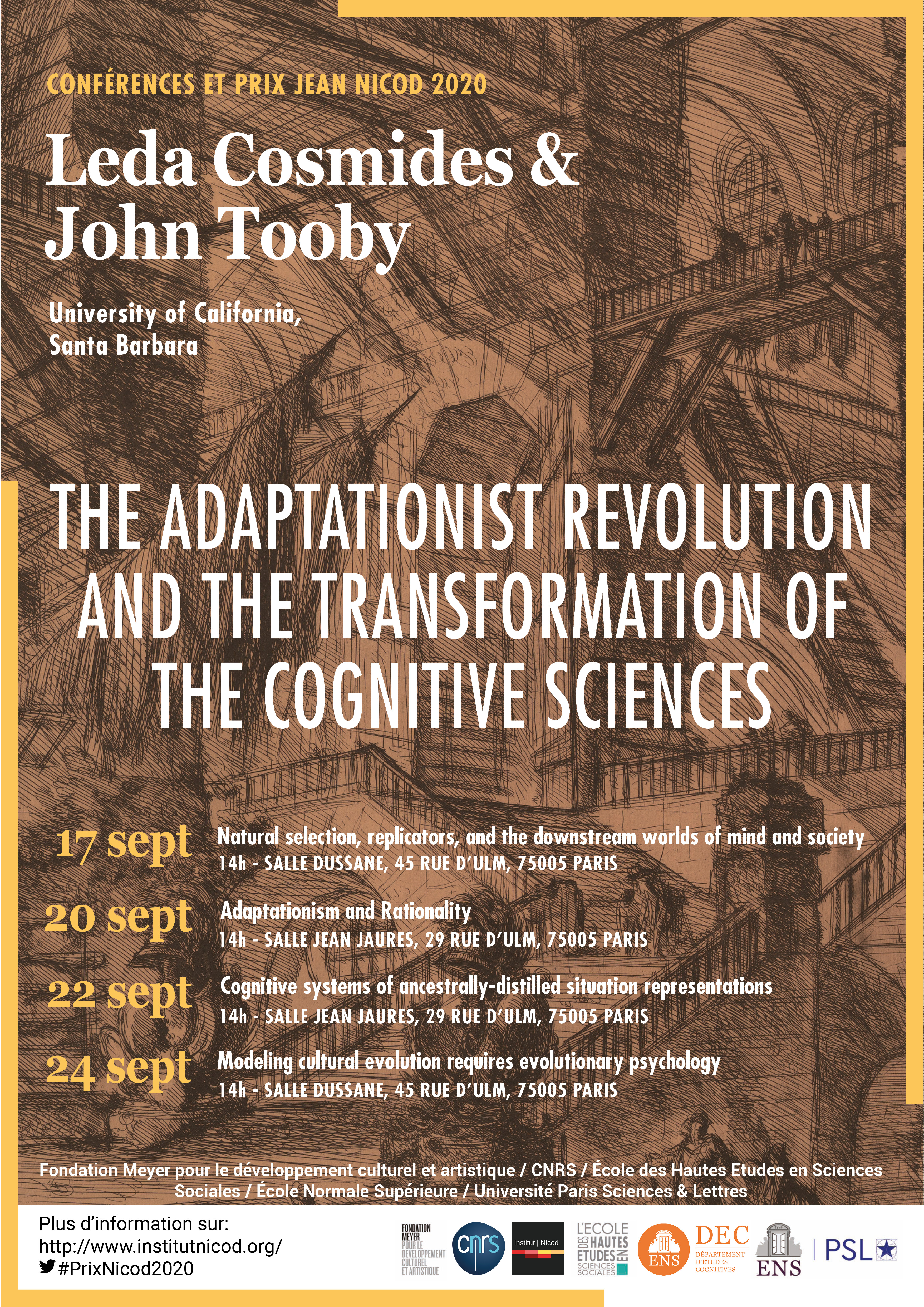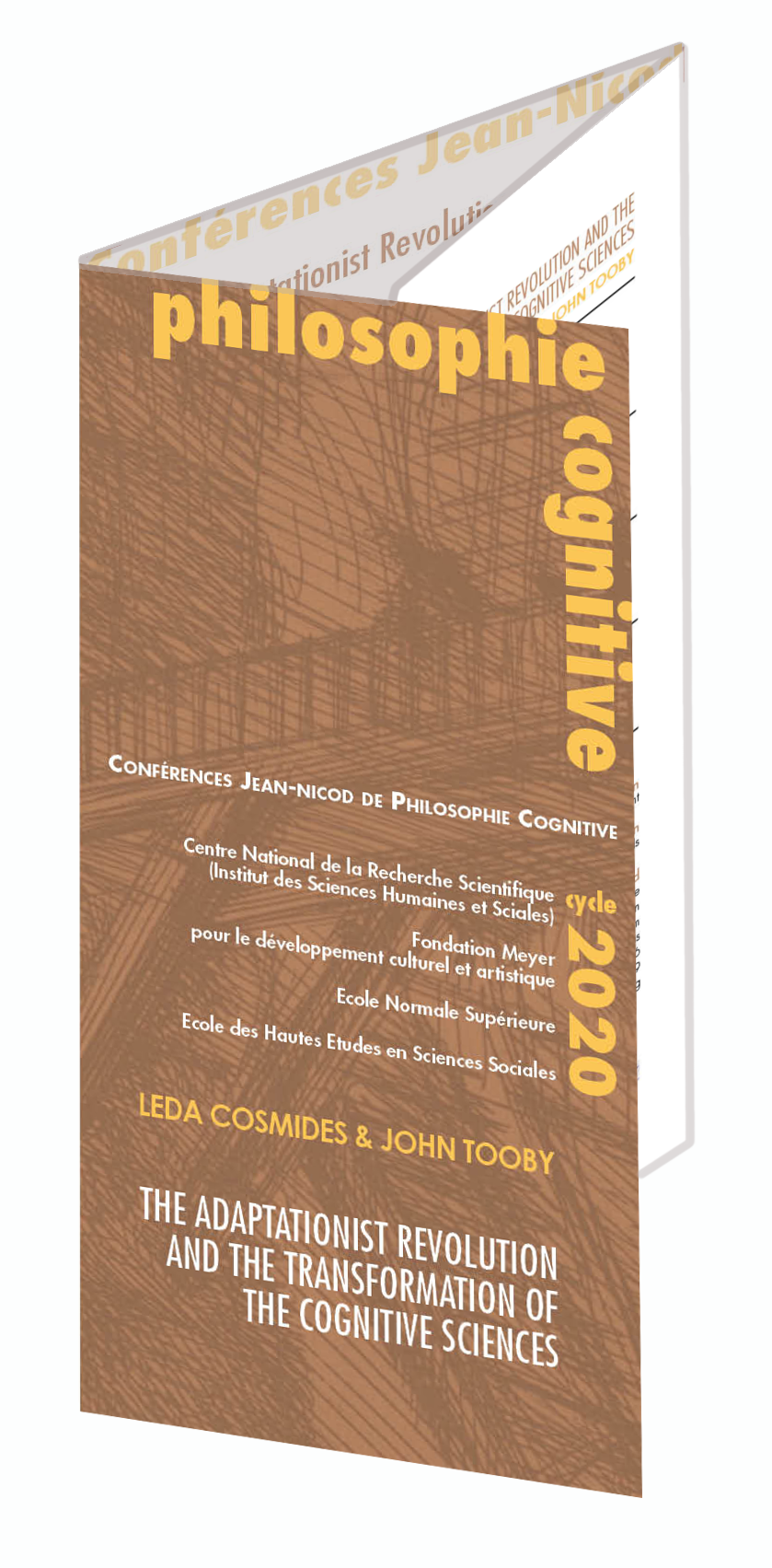Accueil > Séminaires/Colloques > Prix Jean Nicod > Récipiendaires du Prix Jean-Nicod depuis 1993 > Conférences et Prix Jean-Nicod 2020 > Conférences et Prix Jean-Nicod 2020
Conférences et Prix Jean-Nicod 2020

Leda Cosmides et John Tooby sont connus pour leurs travaux de pionniers dans le domaine de la psychologie évolutionniste et des sciences cognitives. Après des études à Harvard et Stanford, ils ont été nommés professeurs à l’Université de Californie à Santa Barbara où ils dirigent le Center for Evolutionary Psychology. Leurs travaux sur le caractère adaptatif des émotions sociales, des liens de parenté, de la coopération et des biais de raisonnement ont eu un retentissement considérable en psychologie et en sciences du comportement. Ils sont également connus pour leur contribution aux fondements conceptuels des approches évolutionnaires en sciences humaines au travers de la publication du livre fondateur de la psychologie évolutionniste, The Adapted Mind : Evolutionary psychology and the generation of culture, qui est aujourd’hui l’un des livres les plus cités en psychologie. En 2013, ils ont reçu le prix de la Human Behavior and Evolution Society pour l’ensemble de leur carrière.
Une première cérémonie de remise des prix a eu lieu virtuellement le 15 décembre 2020. En raison de l’année perturbée, la série de quatre conférences qui suit normalement immédiatement la cérémonie aura lieu à Paris, à l’École normale supérieure, en septembre 2021.
|
|
Natural selection, replicators, and the downstream worlds of mind and society - John Tooby
Remise du Prix Jean-Nicod et cocktail après la conférence
Vendredi 17 septembre - 14h00
Ecole normale supérieure, Salle Dussane
45 rue d’Ulm, 75005 Paris
Over recent decades, many researchers have realized that integrating the evolutionary sciences and information theory with the human sciences can offer a secure foundation out of which to crystalize a more unified and mutually illuminating network of interlocking disciplines. This encompassing framework also offers new directions and some surprising resolutions of long-standing problems in cognitive science and philosophy. The key to this framework lies in the recognition that replication is a physical process that imposes its own proprietary, alternative objective kind of physical order—replicative rather than thermodynamic order. Thus it provides objective frames of reference not susceptible to substantial relativist critiques. Natural selection is the only natural process capable of pushing living organization uphill against entropy, and the only source of this functional order. Hence, replicative order provides the only definition of order appropriate to predicting, explaining, and understanding the functional designs of organisms, including those of their cognitive systems. With a series of examples, we will explore the potential for replicative order to illuminate mind, behavior, and culture.
Suivez la première conférence en ligne sur le YouTube du Département d’Études Cognitives de l’ENS
Adaptationism and Rationality - Leda Cosmides
Lundi 20 Septembre - 14h00
Ecole normale supérieure, Salle Jean-Jaurès
29 rue d’Ulm, 75005 Paris
How the mind works can be illuminated by comparing human cognition to standards of good design specified by a normative theory. But which standards are appropriate for an evolved organism ? What counts as a rational inference or choice for animals like us, whose minds were designed by natural selection ?
Research using normative theories from mathematics and logic painted human cognition as irrational, riddled with errors, biases, and flawed heuristics. Yet natural reasoning systems negotiate the complex natural tasks of their world with a level of operational success far surpassing that of the most sophisticated existing artificial intelligence systems. What is the resolution to this paradox ? From the perspective of evolutionary biology, the problem is not that our thinking is irrational ; it is how psychology has been defining and testing for rationality. With six case studies, we show how this approach can uncover sophisticated cognitive mechanisms, and illustrate the pitfalls of studying the computational systems that produce reasoning without reference to the ancestral problems and environments that selected for their design.
Suivez la deuxième conférence en ligne sur le YouTube du Département d’Études Cognitives de l’ENS
Cognitive systems of ancestrally-distilled situation representations - John Tooby
Mercredi 22 Septembre - 14h00
Ecole normale supérieure, Salle Jean-Jaurès
29 rue d’Ulm, 75005 Paris
For 4 billion years, not a single one of our direct ancestors has ever failed to reproduce. In a world of randomness and entropy, how is this remotely possible ? Moreover, each developing human mind constructs content that is remarkably rich, unique to that individual, and immensely contingent. How can this be reconciled with the claim that the mind runs according to an evolutionary functional logic, and does not start out as a blank slate ?
Natural selection filters for those propagative designs that reliably develop adaptations—including mental programs—that are prepared to meet ancestrally recurrent aspects of the world that were associated with their respective missions (functions). Our evolved architecture is designed to clothe the individual’s contingent world of tokens (e.g, this person, that reptile) in species-universal garments of evolved meaning (e.g., mother, snake) with the help of situation representations. Situation representations provide the shared “code” between the world (as sender) and the organism (as receiver) necessary for learning to proceed. Human mental content is not fully culturally arbitrary ; our rich heritage of species-typical cognitive adaptations endows humans everywhere with a common suite of interpretive and motivational frames that connect us all.
Suivez la troisième conférence en ligne sur le YouTube du Département d’Études Cognitives de l’ENS
Modeling cultural evolution requires evolutionary psychology - Leda Cosmides
Vendredi 24 Septembre - 14h00
Ecole normale supérieure, Salle Dussane
45 rue d’Ulm, 75005 Paris
Cultural differences can arise in surprising ways. All depend on details of our evolved psychology.
Inference, learning, and motivation are regulated by a variety of evolved computational systems, each specialized for a specific domain. Each interprets experience using its own native concepts, generates knowledge that goes beyond the information given, and activates domain-appropriate goals. They influence cultural transmission by making some ideas, feelings, and reactions seem more reasonable, interesting, or memorable than others.
But cultural transmission is not the only route by which cultural differences can arise. Cultural patterns can be evoked, rather than transmitted, when (1) specialized mechanisms are exposed to different environments ; (2) several alternative, cue-activated evolved systems give rise to divergent moral intuitions and motivations ; or (3) a single system is designed to respond nimbly to key cues, shifting behavior immediately ; these shifts can be misattributed to cultural selection of institutions. More powerful and predictive models of cultural evolution will require evolutionary psychology.
MESURES SANITAIRES : Les conférences seront soumises aux mesures sanitaires en vigueur :
- Le Pass Sanitaire à jour obligatoire (pour plus d’information, aller sur le site du gouvernement)
- Port du masque obligatoire
- Émargement sur place d’une feuille de contact pour pouvoir revenir vers vous en cas de cas contact

Sélection bibliographique
- 2018 Sznycer, D., Xygalatas, D., Agey, E., Alami, S., An, X. F., Ananyeva, K. I., ... & Tooby, J. Cross-cultural invariances in the architecture of shame. Proceedings of the National Academy of Sciences, 115(39), 9702-9707.
- 2013 Cosmides, L., & Tooby, J. Evolutionary psychology : New perspectives on cognition and motivation. Annual review of psychology, 64, 201-229.
- 2010 Tooby, J., & Cosmides, L. Groups in mind : The coalitional roots of war and morality. Human morality and sociality : Evolutionary and comparative perspectives, 91-234.
- 2004 Cosmides, Leda and John Tooby. “Evolutionary Psychology and the Emotions,” in Handbook of Emotions. Michael Lewis and Jeannette M. Haviland-Jones, eds. New York : Guilford.
- 2002 Klein, S. B., Cosmides, L., Tooby, J., & Chance, S. Decisions and the evolution of memory : multiple systems, multiple functions. Psychological review, 109(2), 306.
- 2001 Kurzban, R., Tooby, J., & Cosmides, L. Can race be erased ? Coalitional computation and social categorization. Proceedings of the National Academy of Sciences, 98(26), 15387-15392.
- 1994 Cosmides, L., & Tooby, J. Beyond intuition and instinct blindness : Toward an evolutionarily rigorous cognitive science. Cognition, 50(1-3), 41-77.
- 1992 Tooby, J., & Cosmides, L. The psychological foundations of culture. In J. H. Barkow, L. Cosmides, & J. Tooby (Eds.), The Adapted mind : Evolutionary psychology and the generation of culture (p. 19).
- 1989 Cosmides, L. The logic of social exchange : Has natural selection shaped how humans reason ? Studies with the Wason selection task. Cognition, 31(3), 187-276.
- 1987 Tooby, J. & DeVore, I. The reconstruction of hominid behavioural evolution through strategic modelling. In : The evolution of human behaviour, ed. W. Kinzey. State University of New York Press.
Pour toute question, contacter : prixjeannicod@gmail.com
> Frédérique de Vignemont - Secrétaire du Prix Jean-Nicod.
> Marie Lods - Assistante de communication de l’Institut Jean-Nicod.







